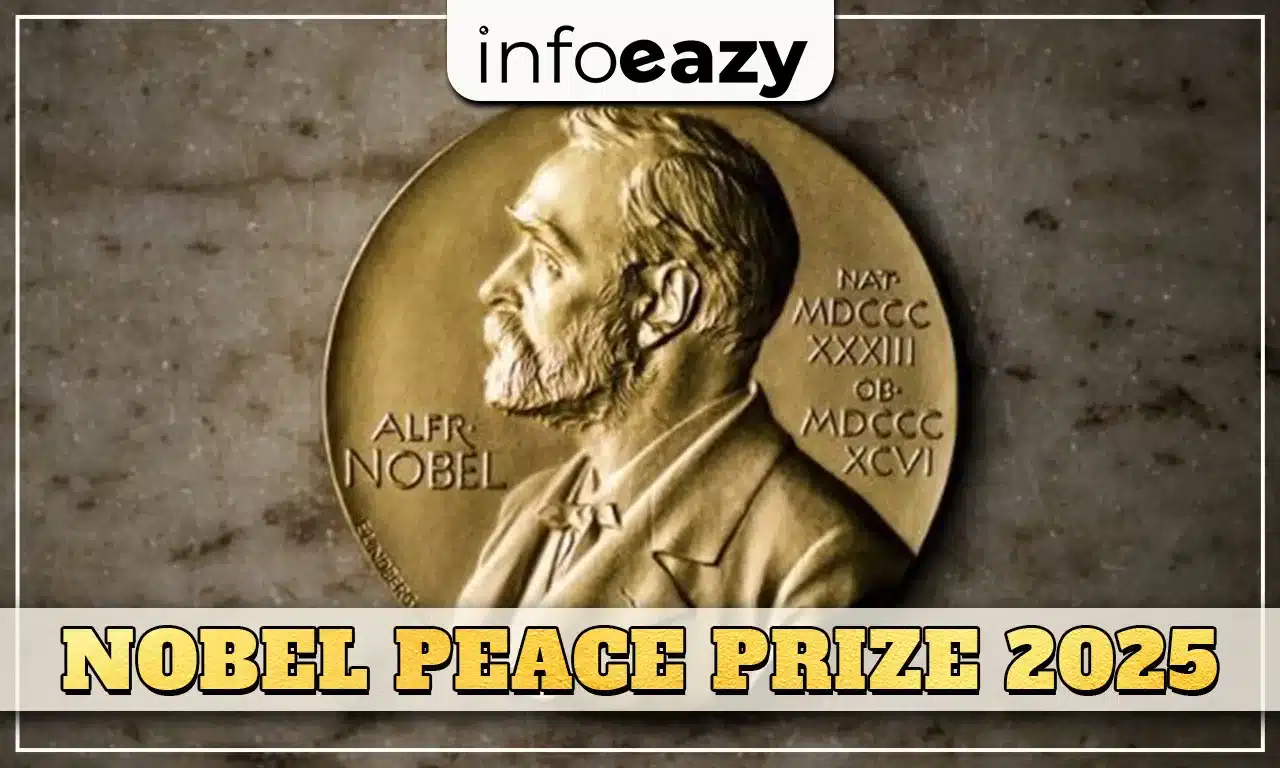The Nobel Peace Prize 2025 is announced on 10 October 2025 by the Norwegian Nobel Committee in Oslo, Norway. The award honors individuals or organizations that have made outstanding contributions to peace, human rights, and global harmony. The official award ceremony will take place on 10 December 2025, marking the anniversary of Alfred Nobel’s death. This year’s laureate continues the legacy of promoting non-violence, dialogue, and international cooperation for a better world.
Nobel Peace Prize 2025
The Nobel Peace Prize 2025 continues the legacy of honoring individuals and organizations dedicated to promoting global peace, human rights, and non-violence. Established in 1901 under the will of Alfred Nobel, the prize symbolizes humanity’s ongoing pursuit of harmony and justice. Over the years, it has recognized peacemakers, reformers, and humanitarian groups who have inspired positive change worldwide. The long list of winners from 1901 to 2025 reflects more than a century of efforts to build a peaceful and compassionate world.
Nobel Peace Prize 2025 Historical Background
- Founder: Alfred Nobel (1833-1896), inventor of dynamite, left most of his wealth to establish the Nobel Prizes.
First Awarded: 1901, jointly to Henry Dunant (founder of the Red Cross) and Frédéric Passy (French peace activist).
Awarding Body: The Norwegian Nobel Committee, appointed by the Norwegian Parliament (Storting).
Location: The Peace Prize is the only Nobel Prize presented in Oslo, Norway, while others are awarded in Stockholm, Sweden.
Criteria: Awarded to individuals or organizations that work to promote peace, disarmament, democracy, and human rights. - Notable Laureates: Martin Luther King Jr., Mother Teresa, Nelson Mandela, Malala Yousafzai, and Kailash Satyarthi.
List of Nobel Peace Prize Winners from 2025-1901
The Nobel Peace Prize has been awarded annually since 1901 to individuals and organizations that have made exceptional contributions to promoting peace, human rights, and global harmony. The list of Nobel Peace Prize winners from 1901 to 2025 highlights over a century of efforts toward ending conflicts, advancing justice, and fostering international cooperation.
| List of Nobel Peace Prize Winners from 2025-1901 | ||
| Year | Laureate(s) | Contributions |
| 2024 | Nihon Hidankyo | For its efforts to achieve a world free of nuclear weapons and for demonstrating through witness testimony that nuclear weapons must never be used again. |
| 2023 | Narges Mohammadi | For her fight against the oppression of women in Iran and her fight to promote human rights and freedom for all. |
| 2022 | Ales Bialiatski, Memorial and Center for Civil Liberties | For promoting the right to criticize power, protect citizens’ rights, and document war crimes and abuses of power. |
| 2021 | Maria Ressa and Dmitry Muratov | For safeguarding freedom of expression, a vital foundation for democracy and peace. |
| 2020 | World Food Programme (WFP) | For its efforts to combat hunger and improve conditions for peace in conflict-affected areas. |
| 2019 | Abiy Ahmed Ali | For his initiative to resolve the border conflict with Eritrea and promote international cooperation. |
| 2018 | Denis Mukwege and Nadia Murad | For their efforts to end the use of sexual violence as a weapon of war. |
| 2017 | International Campaign to Abolish Nuclear Weapons (ICAN) | For its work toward a treaty-based prohibition of nuclear weapons. |
| 2016 | Juan Manuel Santos | For his efforts to end Colombia’s 50-year civil war. |
| 2015 | National Dialogue Quartet (Tunisia) | For helping build a pluralistic democracy in Tunisia after the Arab Spring. |
| 2014 | Kailash Satyarthi and Malala Yousafzai | For their struggle for children’s rights and education. |
| 2013 | Organisation for the Prohibition of Chemical Weapons (OPCW) | For its extensive efforts to eliminate chemical weapons. |
| 2012 | European Union (EU) | For advancing peace, reconciliation, democracy, and human rights in Europe. |
| 2011 | Ellen Johnson Sirleaf, Leymah Gbowee, Tawakkol Karman | For their non-violent struggle for women’s safety and rights. |
| 2010 | Liu Xiaobo | For his long and non-violent struggle for human rights in China. |
| 2009 | Barack H. Obama | For his extraordinary efforts to strengthen international diplomacy and cooperation. |
| 2008 | Martti Ahtisaari | For decades of work to resolve international conflicts. |
| 2007 | IPCC and Al Gore | For efforts to disseminate knowledge on climate change and promote solutions. |
| 2006 | Muhammad Yunus and Grameen Bank | For creating economic and social development from below. |
| 2005 | IAEA and Mohamed ElBaradei | For preventing misuse of nuclear energy and promoting safe use for peace. |
| 2004 | Wangari Maathai | For her contribution to sustainable development, democracy, and peace. |
| 2003 | Shirin Ebadi | For her efforts for democracy and human rights, especially women and children. |
| 2002 | Jimmy Carter | For decades of peaceful conflict resolution and promoting democracy. |
| 2001 | United Nations and Kofi Annan | For their work for a better organized and peaceful world. |
| 2000 | Kim Dae-jung | For promoting democracy, human rights, and reconciliation with North Korea. |
| 1999 | Doctors Without Borders (MSF) | For pioneering humanitarian work worldwide. |
| 1998 | John Hume and David Trimble | For efforts toward peace in Northern Ireland. |
| 1997 | International Campaign to Ban Landmines and Jody Williams | For banning and clearing anti-personnel mines. |
| 1996 | Carlos Filipe Ximenes Belo and José Ramos-Horta | For peace efforts in East Timor. |
| 1995 | Joseph Rotblat and Pugwash Conferences | For efforts to diminish the role of nuclear arms. |
| 1994 | Yasser Arafat, Shimon Peres, Yitzhak Rabin | For creating peace in the Middle East. |
| 1993 | Nelson Mandela and F.W. de Klerk | For ending apartheid and building a democratic South Africa. |
| 1992 | Rigoberta Menchú Tum | For her struggle for social justice and indigenous rights. |
| 1991 | Aung San Suu Kyi | For her non-violent struggle for democracy and human rights. |
| 1990 | Mikhail Gorbachev | For his leadership in transforming East-West relations. |
| 1989 | 14th Dalai Lama | For advocating peaceful solutions based on tolerance and respect. |
| 1988 | United Nations Peacekeeping Forces | For preventing armed clashes and creating negotiation conditions. |
| 1987 | Oscar Arias Sánchez | For working for lasting peace in Central America. |
| 1986 | Elie Wiesel | For being a messenger of peace, atonement, and dignity. |
| 1985 | International Physicians for the Prevention of Nuclear War | For spreading awareness about nuclear war consequences. |
| 1984 | Desmond Tutu | For leading the non-violent struggle against apartheid. |
| 1983 | Lech Wałęsa | For non-violent struggle for free trade unions and human rights in Poland. |
| 1982 | Alva Myrdal and Alfonso García Robles | For work on disarmament and nuclear-free zones. |
| 1981 | UNHCR | For promoting fundamental rights of refugees. |
| 1980 | Adolfo Pérez Esquivel | For inspiring repressed people in Latin America. |
| 1979 | Mother Teresa | For helping suffering humanity. |
| 1978 | Anwar al-Sadat and Menachem Begin | For negotiating peace between Egypt and Israel. |
| 1977 | Amnesty International | For promoting worldwide respect for human rights. |
| 1976 | Betty Williams and Mairead Corrigan | For efforts to end violence in Northern Ireland. |
| 1975 | Andrei Sakharov | For his struggle for human rights and disarmament. |
| 1974 | Seán MacBride, Eisaku Satō | For work toward human rights and nuclear non-proliferation. |
| 1973 | Henry Kissinger and Le Duc Tho | For negotiating a ceasefire in Vietnam. |
| 1971 | Willy Brandt | For fostering East-West reconciliation. |
| 1970 | Norman Borlaug | For leading the Green Revolution. |
| 1969 | International Labour Organization (ILO) | For improving global working conditions. |
| 1968 | René Cassin | For his work on the UN Declaration of Human Rights. |
| 1965 | UNICEF | For its efforts to promote solidarity and aid children worldwide. |
| 1964 | Martin Luther King Jr. | For his non-violent fight for civil rights. |
| 1963 | ICRC and League of Red Cross Societies | For promoting Geneva Convention principles. |
| 1962 | Linus Pauling | For opposing nuclear weapons testing. |
| 1961 | Dag Hammarskjöld | For strengthening the UN’s peacekeeping role. |
| 1960 | Albert Lutuli | For his non-violent struggle against apartheid. |
| 1959 | Philip Noel-Baker | For his contribution to disarmament and peace. |
| 1958 | Georges Pire | For helping refugees rebuild their lives. |
| 1957 | Lester Bowles Pearson | For resolving the Suez Crisis through UN peacekeeping. |
| 1954 | UNHCR | For healing war wounds and aiding refugees. |
| 1953 | George C. Marshall | For the European economic recovery plan (Marshall Plan). |
| 1952 | Albert Schweitzer | For humanitarian work promoting brotherhood. |
| 1950 | Ralph Bunche | For mediating peace in Palestine. |
| 1947 | Friends Service Council and American Friends Service Committee | For relief and peace efforts promoting fraternity. |
| 1945 | Cordell Hull | For his role in founding the United Nations. |
| 1944 | International Committee of the Red Cross (ICRC) | For humanitarian work during wartime. |
| 1938 | Nansen International Office for Refugees | For helping European refugees. |
| 1937 | Robert Cecil | For supporting the League of Nations and disarmament. |
| 1936 | Carlos Saavedra Lamas | For mediating peace between Paraguay and Bolivia. |
| 1935 | Carl von Ossietzky | For defending freedom of thought and peace. |
| 1934 | Arthur Henderson | For efforts at disarmament conferences. |
| 1933 | Sir Norman Angell | For promoting international cooperation and peace. |
| 1931 | Jane Addams and Nicholas Murray Butler | For reviving peace ideals and brotherhood. |
| 1930 | Nathan Söderblom | For fostering Christian unity and peace. |
| 1929 | Frank B. Kellogg | For initiating the Briand-Kellogg Pact. |
| 1927 | Ferdinand Buisson and Ludwig Quidde | For promoting Franco-German cooperation. |
| 1926 | Aristide Briand and Gustav Stresemann | For the Locarno Treaty promoting European peace. |
| 1925 | Sir Austen Chamberlain and Charles G. Dawes | For the Locarno Treaty and Dawes Plan. |
| 1922 | Fridtjof Nansen | For refugee repatriation and humanitarian work. |
| 1921 | Hjalmar Branting and Christian Lange | For contributions to organized internationalism. |
| 1920 | Léon Bourgeois | For work in establishing the League of Nations. |
| 1919 | Woodrow Wilson | For founding the League of Nations. |
| 1917 | International Committee of the Red Cross | For aiding wounded soldiers and prisoners of war. |
| 1913 | Henri La Fontaine | For organizing peaceful internationalism. |
| 1912 | Elihu Root | For improving relations in the Americas. |
| 1911 | Tobias Asser and Alfred Fried | For promoting international law and peace. |
| 1910 | Permanent International Peace Bureau | For organizing global peace movements. |
| 1909 | Auguste Beernaert and Paul Henri d’Estournelles de Constant | For leadership in international arbitration. |
| 1908 | Klas Pontus Arnoldson and Fredrik Bajer | For long-term peace activism and advocacy. |
| 1907 | Ernesto Teodoro Moneta and Louis Renault | For promoting understanding between nations. |
| 1906 | Theodore Roosevelt | For mediating the end of the Russo-Japanese War. |
| 1905 | Bertha von Suttner | For opposing the horrors of war. |
| 1904 | Institute of International Law | For advancing peace through legal cooperation. |
| 1903 | Randal Cremer | For advocating arbitration over war. |
| 1902 | Élie Ducommun and Albert Gobat | For leadership in the Inter-Parliamentary Union. |
| 1901 | Henry Dunant and Frédéric Passy | For humanitarian and diplomatic efforts for world peace. |
Nobel Peace Prize 2025 FAQs
Q1. When will the 2025 Nobel Peace Prize be announced and awarded?+
Q2. How many candidates are nominated for the 2025 award?+
Q3. Can the public see who has been nominated?+
Q4. Who can nominate someone for the Nobel Peace Prize?+
Q5. How does the selection process work?+




